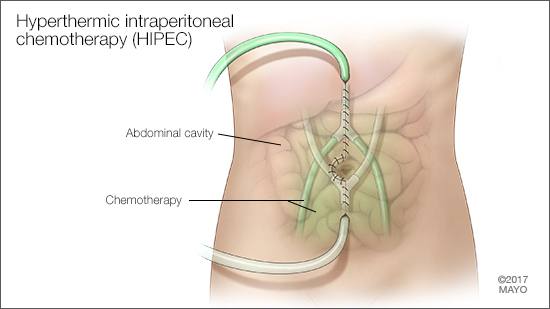-
Cancer
Alternative chemotherapy offers hope for late-stage cancers
 For certain patients with late-stage cancer that has spread to the abdominal cavity, a unique chemotherapy procedure offers hope of increased survival.
For certain patients with late-stage cancer that has spread to the abdominal cavity, a unique chemotherapy procedure offers hope of increased survival.
Unlike traditional chemotherapy that is delivered intravenously, hyperthermic intraperitoneal chemotherapy, also known as HIPEC, works by delivering high-dose chemotherapy directly to cancer cells inside the abdominal cavity.
Hyperthermic intraperitoneal chemotherapy has shown to be effective for patients with advanced or metastatic cancer of the colon, ovary and appendix, and treatment options are not available or already have proven unsuccessful. It also may be used to treat mesothelioma, a rare type of cancer affecting the thin layer of tissue that covers many internal organs.
The hyperthermic intraperitoneal chemotherapy procedure is performed in conjunction with cancer surgery after a surgeon has removed all the visible cancer from inside the abdomen. Then the abdominal cavity is bathed with hot chemotherapy to kill any microscopic cancer cells that might still be present.
“Heating the chemotherapy enhances its effectiveness. That’s because, when it’s hot, chemotherapy penetrates the tissue more deeply, increasing the number of cancer cells it can reach,” explains Dr. Sanjay Bagaria, a Mayo Clinic surgical oncologist.
The specific type of chemotherapy used varies depending on the type of cancer being treated.
“Because HIPEC is a complex procedure, it’s important that we identify those patients who will benefit most. We have learned that certain types of cancers have the best chance of success and possible cure with HIPEC,” says Dr. Bagaria.
Watch Christine Gordon's story about hyperthermic intraperitoneal chemotherapy.
Journalists: Broadcast-quality sound bites with Dr. Bagaria and Dr. Wasif discussing HIPEC are in the downloads at the end of the post. Please ‘Courtesy: Mayo Clinic News Network.’
“HIPEC offers a vast improvement over systemic chemotherapy, which, for many of our patients, is essentially palliative due to the spread of their cancer,” adds Dr. Nabil Wasif, a Mayo Clinic surgical oncologist.
“Research has shown that, in carefully selected patients, such as those with operable metastatic appendix cancer, metastatic colon cancer, metastatic ovarian cancer, and peritoneal mesothelioma, HIPEC can significantly increase the survival rate,” says Dr. Wasif. “With HIPEC, it is possible to completely cure 25 to 30 percent of patients with these types of cancer.”
Media contact: Cynthia Weiss, Mayo Clinic Public Affairs, 904-953-0464, newsbureau@mayo.edu
WATCH: Dr. Wasif explains more about hyperthermic intraperitoneal chemotherapy.







